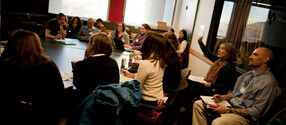Would-Be Teachers Find There’s a Lot to Learn
Laptops in class, teary undergrads, and other pitfalls for TFs in training

On a Thursday morning in late January, a roomful of would-be teachers were struggling, for the moment, to be students.
“Who, me?” one asked, surprised to be called on.
“Yeah, you,” said Virginia Maurer, Associate Director at Harvard’s Derek Bok Center for Teaching and Learning. “You were making eye contact so I picked you.”
The eye-contactor was a confounded-looking graduate student in history. “I was making eye contact because I was paying attention.”
“Just answer the question.”
The question being, what profession besides teaching would you use to describe your approach to teaching?
“Gardener, I guess,” the graduate student conceded. “Because it’s your job to foster intellectual growth.”
“Good,” said Maurer. “Now we’ve broken the ice.”
And so kicked off the Bok Center’s Winter Teaching Conference, an annual primer for graduate students launching their teaching careers. The session was “Fundamentals of Teaching Humanities and Social Science Discussion Sections,” and attendees seemed to be doing their best to provide a typology of the students encountered in section.
In addition to the shy, there was the loquacious:
“I’d say tailor,” answered one woman, “because you need to customize your teaching to suit individual students. Of course today we associate tailors just with haute couture, because we live in a prêt-à-porter culture. But before prêt-à-porter, if you were middle class you’d take all your clothes to a tailor to have them fitted. One size fits all doesn’t look good!”
“Prêt-à-porter comes in many sizes,” said a student from comparative literature, fulfilling the role of combative sectioneer.
“I chose doctor,” said another. “Because a doctor doesn’t need to explain why what works works.”
After the icebreakers, attendees were given the chance to pose questions to a panel of experienced departmental teaching fellows.
“What do we do when a student gives a wrong answer?” someone asked. “How do we correct them without hurting their feelings?”
“I find it helpful to accept all responses as fundamentally benevolent,” offered a fellow from Near Eastern Languages and Civilizations, dressed in elegant checkered pants. “Be sure not to judge. Then, find a position of humor from which to refashion the response.”
“Are we allowed to ban laptops? Will they hate us for it?”
Toward the session’s end, the fellows solicited contributions to a blackboard list of common stereotypes about Harvard undergraduates. The final list ran:
- Anxious
- Busy
- Need Rules + Structure
- Entitled
- High Expectations
- Young/Unreliable
- Diverse
One of the fellows regarded the list, nodding. “Yes, exactly, diverse. So obviously, none of these stereotypes can really be true.”
Meanwhile, in a room upstairs, an undergraduate was crying. “I was just, really surprised,” she got out between sobs, “to see my grade on the midterm. I studied so, so hard. I did everything I was supposed to, and I just don’t understand why I got a C. My dad is going to kill me!”
The graduate student she was appealing to studied her like a dangerous animal. Finally he put out a hand, and touched her shoulder. “It’s OK,” he said. “It’s OK. I know you’ve been trying really hard.”
“OK, great!” Lee Warren, Bok Associate Director Emerita, was clapping. The sobbing “undergraduate” was really an actress from the “Bok Players,” and the teary scene that had just unfolded was an improvisational exercise in TF crisis management. “Have you ever had a situation like that with one of your real students?” she asked the graduate student, who still looked shaken up.
“Yeah, once.”
“What did you do?”
“I went to the vending machine. I got her an orange juice.”
After lunch, the false undergraduates were swapped out for a pack of real ones, who huddled at the end of a long table while graduate students swooped down hungrily around them.
Trevor Baca, the departmental teaching fellow from the music department, was leading the session. “Here we’ve captured some students for you,” he began, “so you can ask them whatever you want.”
The first question was about their best experience with a TF. A math concentrator answered: “Availability. I had a TF who literally would let me reschedule lab for whenever I wanted. He even gave us his cell phone number. I called him at one a.m. the night before the final.”
Baca waved his hands, shouting over the collective groan. “Just to be clear: you don’t need to be perpetually available for your students.”
On came the questions: what should I do for the first meeting of section? What kind of feedback do you want on assignments? Should I aim to teach to the highest or lowest denominator? And then, “What do you want your TFs to wear?”
“I actually wrote a series in the Crimson about this,” replied a psychology concentrator. “First, don’t smell. After that, we appreciate TFs with a unique fashion sense, but it’s not necessarily a requirement.”
“Final questions?” Baca asked, as the conference drew to a close.
A hand went up. “If we ban laptops, will you hate us?”
Get the Latest Updates
Join Our Newsletter
Subscribe to Colloquy Podcast
Simplecast Stitcher





